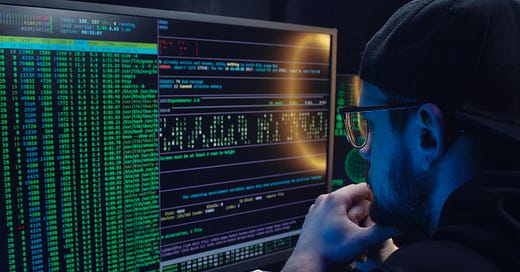AI for All
Internet pioneer Vint Cerf on the future of AI — and the little-known breakthrough he’s most excited about.
“Don’t accept AI-generated output as fact without checking. AI can sound authoritative even when it’s completely wrong.” —Vint Cerf
When the man who helped create the internet warns you about technology, you listen.
Imagine sitting across from someone who helped shape the digital world we live in. That's Vint Cerf. Before your smartphone, before social media, before you ever clicked on a website, Vint was part of the team designing the foundations that would connect humanity. As co-creator of TCP/IP protocols, he's witnessed digital breakthroughs unfold from a unique perspective.
I dropped Vint a note precisely at the moment when AI's trajectory feels both exhilarating and…precarious. I was lucky enough to grab some time with him when it feels like we're all trying to make sense of these incredible new tools. While some of us are still figuring out whether to be amazed or alarmed, Vint offers something valuable: perspective from someone who's experienced technological revolutions firsthand.
What stuck with me most? Understanding where AI is actually useful: It's your hidden superpower in this new world. It's the difference between being swept away by the AI current and navigating it confidently.
Let’s dive into the chat with Vint.
Vint, I'm curious: We're all experiencing this AI moment in different ways. How has it actually shown up in your daily life this past year?
For me, my day-to-day hasn’t changed drastically, but it’s starting to make a difference. I’ve found it really helpful for things like prepping presentations or organizing my thoughts for a talk. Tasks that used to take hours are now much quicker with AI lending a hand.
That's a common experience: Many people are finding AI helpful but not revolutionary yet. Let's zoom out a bit, though. Beyond these assistant-like functions, what might be coming down the road that could really change the game for all of us?
I think we’ll see AI get a lot better, fast. The quality of the output will improve. Hallucinations will drop. AI will get baked into more apps, old and new. The big question is: Can we get ahead of misinformation? Making sure these systems are reliable and accurate is crucial.
You've had this front-row seat to so many technological breakthroughs. When you look at AI through that experienced lens, what are you personally championing about it, and what keeps you up at night?
I’m not actively building AI models, but I’m strongly advocating for better controls to prevent AI from spreading misinformation. These systems are powerful, and if left unchecked, they can amplify errors at scale.
What should everyday users be aware of when engaging with AI?
Don’t accept AI-generated output as fact without checking. AI can sound authoritative even when it’s completely wrong. Critical thinking and verification are essential.
Something I've always admired about you is how you spot hidden potential others miss. Is there something amazing about AI that's flying under most people's radar right now?
Accessibility. AI could be a game-changer for people with disabilities by helping navigate digital spaces, access services, and even communicate more easily. We’re just starting to scratch the surface, and it’s an area that deserves a lot more attention.
Wow, that really puts things in perspective: Technology at its best should open doors for everyone. Before I let you go, if you could leave our readers with one guiding star, what would it be?
I mean, there are a lot of things I want to say, but If there’s one thing I’d leave people with, it’s this: When AI gets used in high-stakes areas like healthcare, hiring, or finance, we can’t just move fast and break things. We need safeguards in place and real proof that these systems are reducing risks before they’re out in the world. We have to be intentional about building tools that break down barriers, not reinforce them.
A huge thank you to Vint Cerf for chatting with me this week!
My biggest takeaway is that we need to get an understanding of what these tools can do, what they can't, and when to use them.
The internet became revolutionary because it wasn't shaped by a select few. It evolved through countless individuals who saw possibilities and acted on them. For AI to follow this path and become a tool that serves everyone, we need everyone to help shape it. That means you. Don't sit on the sidelines. Get curious. Experiment. Build something.
You don't need special credentials to influence how these technologies develop and who they serve — just a willingness to engage. So we're curious: Where do you see opportunities for AI to democratize rather than concentrate power? Share your thoughts in the comments: Your voice matters more than you might think.




